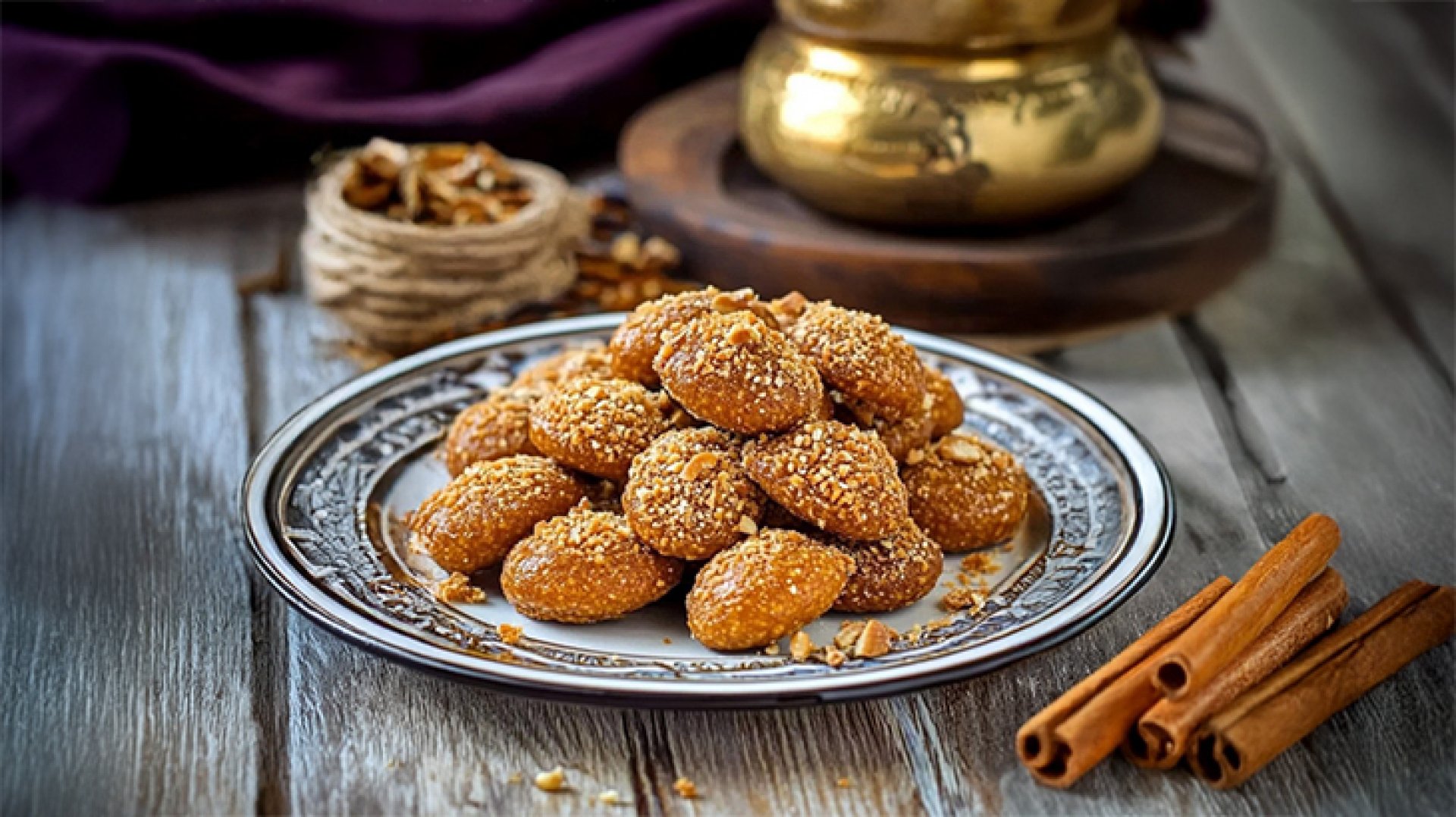Melomakarona

A Beloved Greek Holiday Treat Steeped in History and Flavor
Melomakarona (pronounced meh-loh-ma-KA-roh-nah) are among the most iconic traditional Greek sweets, especially during the Christmas and New Year season. These oval-shaped or cylinder-like cookies are made with a dough consisting of flour, olive oil, semolina, and fragrant spices like cinnamon and clove. After baking, they are generously soaked in a warm syrup made from honey and sugar, and topped with a sprinkling of crushed walnuts.
Though simple in appearance, Melomakarona are rich in history, symbolism, and deep-rooted culinary tradition.
The Etymology and Meaning Behind the Name
The name Melomakarona comes from the combination of two ancient Greek words:
- Méli (μέλι) meaning honey
- Makaron (μακαρών) meaning blessed or a state of joy or happiness
This fusion symbolizes a blessing through honeynot only a literal description of the desserts preparation but a poetic reflection of what it represents: joy, abundance, and well-wishes.
Ancient Origins: From Funerary Bread to Festive Cookie
Melomakarona can trace their roots back to ancient Greek ceremonial bread called Makaria (μακαρία), which was offered during funerals as a gesture of respect and remembrance for the deceased. It was seen as a symbolic food for the souls peaceful journey and a hope for spiritual bliss in the afterlife.
During the Byzantine era, this solemn bread evolved into something more celebratory. Honey syrup was added, reflecting the Christian symbolism of eternity and divine sweetness, while walnuts came to represent prosperity and wisdom. Over time, these ingredients transformed the somber Makaria into the joyful, honeyed cookie now known as Melomakarona.
The Ottoman Influence: Spices, Oil, and Aroma
From the 15th to the 19th century, Greece was under Ottoman rulea period that profoundly shaped Greek cuisine. Ottoman culinary influence introduced a variety of spices, including cloves, cinnamon, and nutmeg, which became core elements in many Greek sweets.
Equally significant was the shift from using butter or animal fats to olive oil, aligning with the Mediterranean diet and further enhancing the moist, crumbly texture of Melomakarona. The addition of orange juice and zest came later, infusing the cookies with brightness and balancing the richness of the syrup.
Thus, Melomakarona became a true blend of ancient Greek, Byzantine, and Eastern Mediterranean flavorsa culinary testament to centuries of cultural exchange.
Symbolism in Every Bite
In Greek tradition, every ingredient in Melomakarona has symbolic meaning:
- Honey represents blessings, happiness, and a sweet life
- Walnuts symbolize abundance, knowledge, and fertility
- The Spices like cinnamon and clove bring warmth, harmony, and protection
- Olive oil connects the cookie to the sacred olive tree, a symbol of peace and purity
Because of these meanings, Melomakarona are not just delicious treatsthey are culinary wishes for prosperity, good health, and joy shared among family and friends.
A Festive Essential for Greek Celebrations
Though Melomakarona can be enjoyed year-round, they are most commonly associated with Christmas, New Year, and Epiphany. In many Greek households, baking Melomakarona is a cherished tradition, often done in large batches, with the help of multiple generations.
The cookies are frequently paired with Kourabiedes (Greek butter cookies dusted with powdered sugar), and the two together form a classic festive offering on holiday dessert tables.
A Global Treat with Local Twists
As Greek immigrants moved abroad, they carried with them not only their faith and customs but also their food. Melomakarona spread to Greek communities in the United States, Canada, Australia, and Western Europe.
In modern times, recipes may vary slightly:
- Some versions include brandy or cognac in the dough
- Others use almonds, pistachios, or sesame seeds instead of walnuts
- Some omit the honey syrup for a lighter option or offer vegan adaptations
Despite these changes, the essence of Melomakarona remains: a rich, aromatic cookie steeped in tradition, soaked in sweetness, and made to be shared.
More Than a Cookie A Sweet Cultural Expression
Melomakarona have survived centuries of history and cultural changenot as a relic, but as a living tradition. They are as much about flavor as they are about family, memory, and meaning. Whether served at a Christmas table in Athens or a bakery in Melbourne, Melomakarona carry the soul of Greek hospitality and heritage in every bite.
To taste a Melomakarono is to taste the layered story of Greeceone of love, resilience, sweetness, and celebration.


